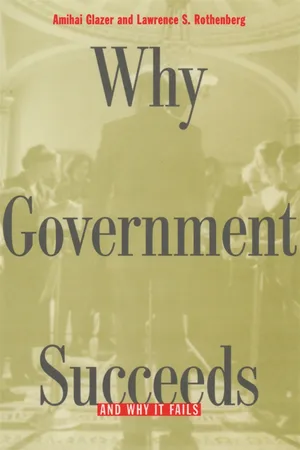
- 225 pages
- English
- PDF
- Available on iOS & Android
Why Government Succeeds and Why It Fails
About this book
This book looks beyond politics to show how the ability of the U.S. government to implement policies is strongly affected by various economic constraints. These include the credibility of the policies, the ability of government to commit to them, the extent to which firms and consumers rationally anticipate their effects, whether the success of a policy further encourages firms and individuals to behave in intended ways, and whether the behavior of such actors can be sustained without continued government intervention.
The authors apply these concepts to four areas of policy: macroeconomic policies to promote employment and economic growth, redistributive policies to benefit the poor and the elderly, production policies to provide goods and services, and regulatory policies to guide the behavior of firms and individuals. In doing so they provide plausible explanations of many puzzling phenomena—for example, why government has been successful in reducing cigarette smoking, but has failed to get people to install and maintain emission-control devices in their cars.
This book recasts debates about public policy, avoiding conventional "pro-government" or "anti-government" positions; rather, it helps to predict when public policy will succeed.
Frequently asked questions
- Essential is ideal for learners and professionals who enjoy exploring a wide range of subjects. Access the Essential Library with 800,000+ trusted titles and best-sellers across business, personal growth, and the humanities. Includes unlimited reading time and Standard Read Aloud voice.
- Complete: Perfect for advanced learners and researchers needing full, unrestricted access. Unlock 1.4M+ books across hundreds of subjects, including academic and specialized titles. The Complete Plan also includes advanced features like Premium Read Aloud and Research Assistant.
Please note we cannot support devices running on iOS 13 and Android 7 or earlier. Learn more about using the app.
Information
Table of contents
- Cover
- Title Page
- Copyright
- Dedication
- Contents
- Acknowledgments
- Introduction: Public Policy—Limits and Possibilities
- Chapter 1. Macroeconomics: Can Government Control the Economy?
- Chapter 2. Redistribution: A Success Story?
- Chapter 3. When Can Government Regulate?
- Chapter 4. Producing Goods and Services: Getting the Right Mix
- Chapter 5. Economic Constraints and Political Institutions
- Chapter 6. Final Thoughts
- Notes
- References
- Index